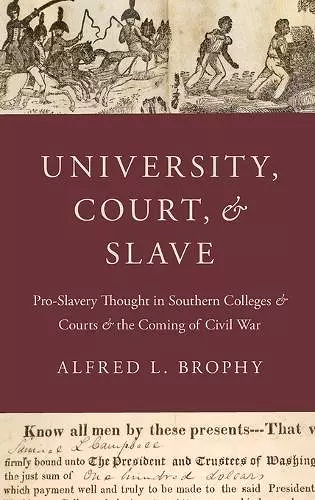University, Court, and Slave
Pro-Slavery Thought in Southern Colleges and Courts and the Coming of Civil War
Format:Hardback
Publisher:Oxford University Press Inc
Published:8th Sep '16
Currently unavailable, and unfortunately no date known when it will be back
This hardback is available in another edition too:
- Paperback£22.49(9780190933760)

Alfred L. Brophy's University, Court, and Slave reveals long-forgotten connections between pre-Civil War southern universities and slavery. Universities and their faculty owned people -- sometimes dozens of people -- and profited from their labor while many were physically abused on their campuses. Education was often paid for through the profits of enslaved labor. University faculty -- and students -- also promoted the institution of slavery. They wrote about the history of slavery, its central role in the southern economy, and developed a political theory that justified keeping some people in slavery. The university faculty spoke a common language of economic utility, history, and philosophy with those who made the laws for the southern states. That extensive writing promoting slavery helps us understand how southern politicians and judges thought about slavery. As antislavery rhetoric gained momentum, southern academics and their allies in the courts became bolder in their claims. Some went so far as to say that slavery was supported by natural law. The combination of economic reasoning and historical precedent helped shape a southern, proslavery jurisprudence. Following Lincoln's November 1860 election southern academics joined politicians, judges, lawyers, and other leaders to argue that their economy and society was threatened. Southern jurisprudence led them to believe that any threats to slavery and property justified secession. In some cases, academics took their case to the southern public and, in one case, to the battlefield, to defend slavery.
[I]mportant.... Brophy adds meaningfully to the broader field of southern intellectual history.... Scholars of southern intellectual life, education, and the law will find Brophy's thorough analysis of both landmark and obscure proslavery literature useful and provocative. * The Register of the Kentucky Historical Society *
Brophy's book is a well-crafted introduction to pro-slavery thought as expressed in venues that historians have not visited often enough. * Mark Tushnet, Journal of Interdisciplinary History *
The labor lords of the antebellum American South did not just engage in a war of maneuver, but also in a war of position. Violence and brute force allowed them to dominate their workers, but, as Al Brophy shows in this fascinating study, so was the development of an ideological and legal edifice that justified the persistence of slavery in the American republic. To understand slavery, agues Brophy, we need to not just think of the lash, the overseer and the plantation, but also the law, the courts and southern universities. Sophisticated lawyers, smart professors and passionate ideologues enabled unfathomable repression to descend upon millions of enslaved Americans. * Sven Beckert, Laird Bell Professor of History, Harvard University and author of Empire of Cotton: A Global History *
In this deeply researched, beautifully written book, Alfred Brophy recreates the world of pro-slavery academics and jurists and their literary critics-north and south, well-known and largely forgotten. This important volume reinforces the pervasiveness of pro-slavery thought in the nineteenth-century United States, and reinvigorates our understanding of the intellectual and cultural histories and legacies of the slavery era in our legal system. * Leslie M. Harris, Professor of History, Northwestern University and author of In the Shadow of Slavery: African Americans in New York City, 1626-1863 *
A learned treatise about learned treatises, University, Court, and Slave introduces readers to the professors and jurists who sustained American slavery. Reaching far beyond the standard intellectual histories of pro-slavery thought, Brophy recovers the potent interplay of slaveholding jurisprudence and university curricula in protecting property rights in people and shaping the nature of liberal market society in the nation as a whole. This is a major accomplishment and a significant contribution to the revitalized study of slavery and capitalism. * Seth Rockman, Associate Professor of History, Brown University and co-editor of Slavery's Capitalism: A New History of American Economic Development *
ISBN: 9780199964239
Dimensions: 165mm x 239mm x 38mm
Weight: 635g
402 pages